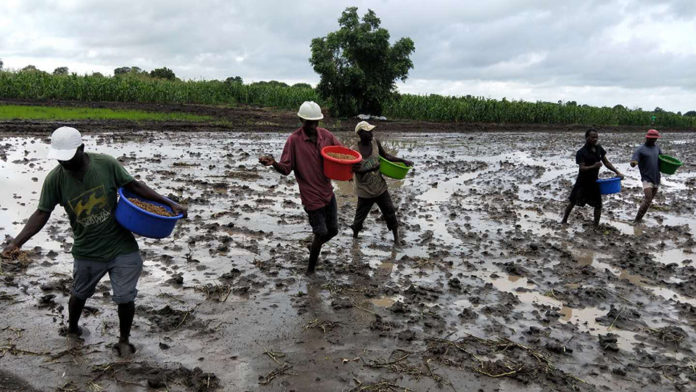Over 60 farmers in Matola near Maputo, Mozambique have taken to growing rice near, and the harvest provides each farmer with between four to six bags of the crop.
In recent years, the land was a swamp full of reeds before the local residents in February 2021 moved in and turned it into small-scale rice production.
The new farmers come from neighbourhoods in Magude, Trevo and Infulene, all along National Road Number Four in Maputo province.
They have also found rice production as an alternative to unemployment, which is on the rise in Mozambique.
“Hunger respects no one. I don’t work, but I have a family and children, and everyone needs to eat. When the government said that anyone who didn’t have work must grow, I chose rice,” Agy Albino, one of the farmers, says.
The 60-year-old is from Zambézia where he learned to grow rice. He came to Maputo in search of better conditions, but when the Covid-19 pandemic broke out in 2020, he and his daughter lost their source of income. Left with no alternative, they cleared the reeds and planted rice.
“We don’t know if it’s going to work, but we’ll produce to see how it goes,” Albino’s daughter says
Gordino Pereira is also a farmer in the area. He says that, at the beginning, he grew cabbage and other vegetables, but when people started growing rice in the area, he decided to join in, and acquired a plot.
“Here, the reeds were high and there were bandits hiding in them, so we decided to cut them down. The neighbourhood secretaries managed the distribution of plots – we paid 1,000 meticais for a 50 by 30-metre space,” Pereira added.
“Last year, I sold some sacks of bags. And I hope that, with this rain, I will get more. Here, we produce to eat, with the children here at home, given that my husband has no job,” Gina Emílio said.
From plots of about 50 metres square, each producer manages to harvest, on average, four to six bags of rice. Most is intended for home consumption, but some are already thinking about trade.
Every day, more residents from the local neighbourhoods decide to engage in rice production. Some of these “accidental farmers” are already thinking of increasing their production to supply local neighbourhoods in the near future.








